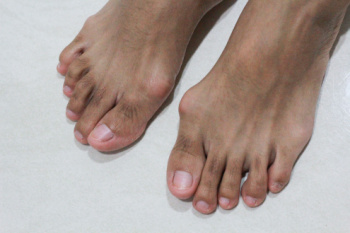
Bunions often form slowly, creating a bony bump at the base of the big toe that can become painful and inflamed. While surgery is one option, many people find relief through non-operative care. Changes in footwear can make a big difference. Shoes with a wide toe box and soft materials reduce pressure on the joint. Custom orthotics may help improve alignment and slow the progression of the deformity. Padding and taping can also reduce discomfort during daily activities. In some cases, targeted exercises can improve joint flexibility and strengthen surrounding muscles. Anti inflammatory medication may offer temporary relief when swelling flares up. If your bunions are starting to affect your comfort or limit your choices in footwear, it is suggested that you see a podiatrist for additional relief options.
If you are suffering from bunion pain, contact Wendy K. Stinson, DPM of New Jersey. Our doctor can provide the care you need to keep you pain-free and on your feet.
What Is a Bunion?
Bunions are painful bony bumps that usually develop on the inside of the foot at the joint of the big toe. As the deformity increases over time, it may become painful to walk and wear shoes. Women are more likely to exacerbate existing bunions since they often wear tight, narrow shoes that shift their toes together. Bunion pain can be relieved by wearing wider shoes with enough room for the toes.
Causes
- Genetics – some people inherit feet that are more prone to bunion development
- Inflammatory Conditions - rheumatoid arthritis and polio may cause bunion development
Symptoms
- Redness and inflammation
- Pain and tenderness
- Callus or corns on the bump
- Restricted motion in the big toe
In order to diagnose your bunion, your podiatrist may ask about your medical history, symptoms, and general health. Your doctor might also order an x-ray to take a closer look at your feet. Nonsurgical treatment options include orthotics, padding, icing, changes in footwear, and medication. If nonsurgical treatments don’t alleviate your bunion pain, surgery may be necessary.
If you have any questions, please feel free to contact our office located in Parsippany-Troy Hills, NJ . We offer the newest diagnostic and treatment technologies for all your foot care needs.
